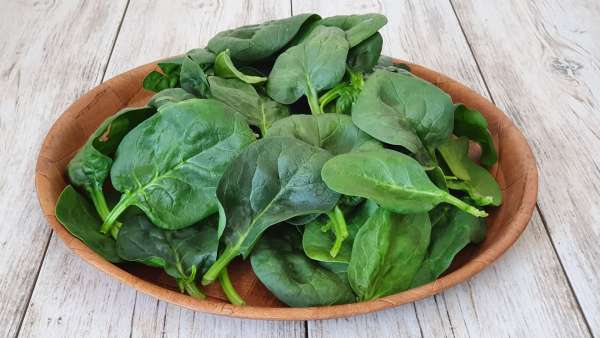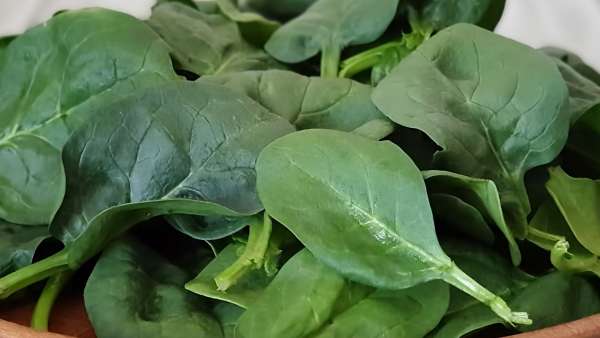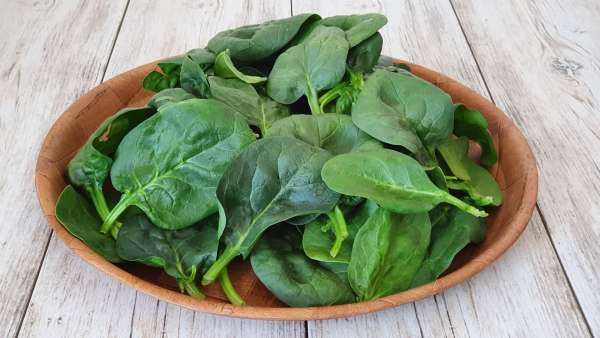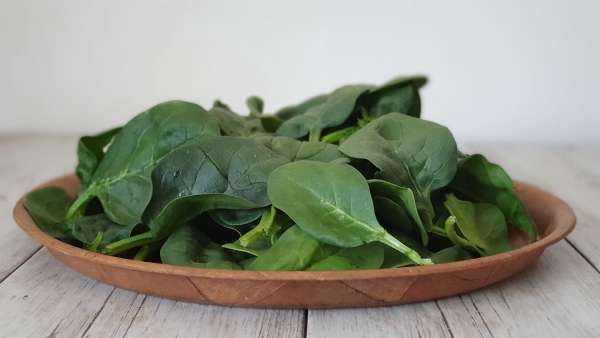Spinach
Spinach, wonder food
Spinach, also popularly known as spinach, is a wonder food, rich in iron and multivitamins, which has multiple benefits on physical and mental health, being used both for medicinal purposes and in daily nutrition by housewives and people who are convinced and convinced of the satisfaction of a healthy life.
Spinach is an herbaceous leguminous plant with extraordinary health benefits, thanks to the multiple beneficial effects it has on humans, being rich in a variety of essential nutrients: vitamin K, vitamin A, vitamin B2, vitamin B6, vitamin E, vitamin C, manganese, folate, copper, magnesium, potassium, calcium and iron. According to historical studies, spinach is most probably of Persian origin (dating back some 2000 years), introduced through trade lines to ancient China, Arabia and Africa, and then, thanks to the medieval wars of Muslim expansion, to Europe - from where it later spread to the New World during the colonial era.
Where can it be sourced?
Today, spinach is grown almost everywhere in the world, both in fields and greenhouses for mass agriculture and in the gardens of people enthusiastic about the benefits it offers - China is the world's leading producer of spinach, producing around 90% of the world's total in 2018. Spinach also comes in two main forms: spinach in its mature form and baby spinach - although the differences between the two are not significant, it should be noted that baby spinach leaves contain slightly lower concentrations of oxalic acid, an absorption inhibitor, and are therefore intended for people who prefer to eat spinach raw.
How can it be eaten?
Spinach (including baby spinach) can be eaten either raw (on its own, in various combinations with other raw foods - salads with carrot, celery, radish, in smoothies) or cooked (in salads - tuna salad with spinach and boiled eggs or spinach and feta cheese salad, soups and broths - creamed spinach soup, spinach and creamed spinach soup omelettes - omelette with spinach and Greek yoghurt or omelette with spinach and cheese, pasta - spaghetti with garlic and spinach or pasta with mushrooms and creamy spinach sauce, crepes - crepe with spinach and cheese, pancakes - pancakes with spinach and cheese, pies - Greek pie with salted cheese and spinach or spinach soté).
Nutritional values spinach (per 100g)
Nutritional values
- Calories/energy: 23kcal- Protein: 2.86g
- Carbohydrates: 3.63g
- Fat: 0.39g
- Fiber: 2.2g
- Carbohydrates/Sugars: 0.42g
Vitamins
- B4/Coline: 19.3mg- A: 9377IU
- A: 469µg
- B1/Tiamine: 0.078mg
- E (alpha-tocopherol): 2.03mg
- B2: Riboflavin: 0.189g
- B3 (PP)/Niacin: 0.724mg
- B5: Pantothenic Acid: 0.065mg
- B6: 0.195mg
- K (Phylloquinone: K1): 482.9µg
- C: 28.1mg
- B9/F folic acid: 194µg
Minerals
- Calcium: 99mg- Copper: 0.13mg
- Iron: 2.71mg
- Phosphorus: 49mg
- Magnesium: 79mg
- Manganese: 0.897mg
- Potassium: 558mg
- Selenium: 1µg
- Sodium: 79mg
- Zinc: 0.53mg
Benefits of eating spinach
Spinach is a food full of beneficial properties, its high intake of vitamins and nutrients ensuring optimal development of the body, detoxifying, reducing fatigue, regulating blood pressure and inflammation, while boosting immunity and even improving the human psyche.
Aids medical recovery
Spinach facilitates the body's regenerative processes, aiding in the medical recovery of organs and even treating ulcers - it is also recommended during colds and flu, as its high intake of zinc and vitamin C speeds up recovery.
Detoxifies the body
Spinach, thanks to its nutritional variety (in terms of both macro- and micro-nutrients) and its antioxidant and depurative properties, cleanses the body of toxins, balancing and healing it.
Treats digestive tract disorders
Spinach helps to cleanse and regenerate the digestive tract (not for nothing is it popularly known as the 'broom of the gut'), facilitating the elimination of toxins and stimulating appetite (beneficial in cases of anorexia or other eating disorders resulting from malnutrition).
Reduces fatigue and exhaustion
Spinach, thanks to its multitude of nutrients beneficial to the human psyche, reduces states of fatigue and exhaustion, which are common during stressful periods (affecting the body both physically and mentally) and during periods of intense physical and intellectual effort.
Improves mental health
Spinach contributes to a healthy nervous system by facilitating the production of serotonin, the so-called "feel-good hormone", deficiencies of which can cause serious mental disorders: depression, epilepsy, phobias, obsessive-compulsive disorder (OCD), post-traumatic stress disorder (PTSD), epilepsy, generalized anxiety disorder, etc.
Lowers high blood pressure
Thanks to its high mineral content (including potassium and sodium), spinach regulates blood pressure and blood flow and is recommended for people suffering from high blood pressure and circulatory problems.
Reduces acne
Spinach, rich in a variety of B-vitamins and vitamin E (vitamins good for skin health), clears the face and body of acne (particularly the mild forms - comedon acne and papular-pustular acne), fighting inflammation.
Boost immunity
Spinach is rich in antioxidants and beta-carotene, which increase the body's ability to fight off pathogens, thus decreasing the risk of infection - also, the high amount of magnesium, zinc and vitamin C in spinach helps to improve and support overall immunity.
Treats anemia
Rich in iron and vitamins, spinach treats anemia, which can be caused by either an iron deficiency, vitamin deficiency or thyroid disorders (spinach can relieve the symptoms of these by regulating hormone production and related processes).
Asthma ally
Thanks to its high intake of beta-carotene and magnesium, spinach reduces the frequency of asthmatic attacks and may even prevent them (in allergic asthma, if consumed before exposure to allergens, and in exercise-induced asthma, if consumed before strenuous physical activity) - assumptions verified and validated by studies initiated by the Allergy Department of Hasharon Hospital in Israel.
Risks and contraindications
Spinach in general is safe for pregnant and breastfeeding mothers as long as it is consumed in food form - the safety of medicinal doses (spinach powder, for example) is uncertain. Also, ingestion of spinach by children under 4 months of age is again unsafe, as methaemoglobin (metHb) can be produced, which can cause dysrhythmias, seizures, coma and even death.
Spinach can lower blood sugar levels, and if following a diabetes medication plan, it is recommended that you consult with your diabetologist to determine the recommended amount (daily and/or weekly) of spinach. It is also recommended to stop eating spinach at least two weeks before having an operation.
Consuming too much spinach can lead to kidney stones, which are harmful to the normal functioning of the body and can significantly degrade the health of the individual, especially if they suffer from associated conditions.
Conclusion
Therefore, spinach is an indispensable food and its consumption guarantees a healthy, trouble-free and rewarding lifestyle - whether you want to recover after a long period of stress, detoxify your body or become more rested and energetic (or want to relieve the symptoms of chronic diseases such as asthma), spinach is your best friend and your main ally.




Comments